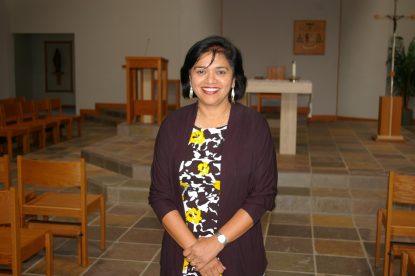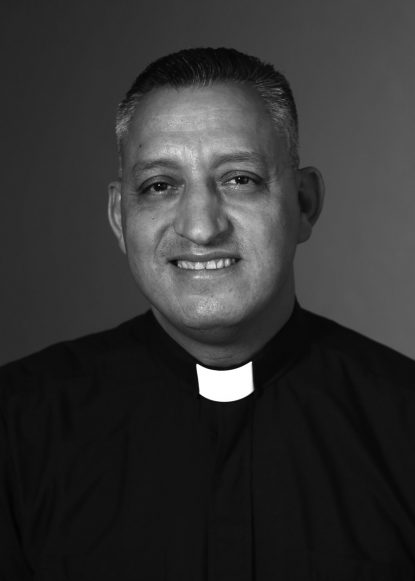
Elizabeth Joseph, principal at St. Francis of Assisi School in Vista, Calif., is seen in this undated photo. (CNS photo/courtesy The Southern Cross)
If last year’s Paycheck Protection Program was like a matching grant, prompting recipients to stretch resources in order to maintain payroll and stay afloat during the pandemic spring, then it achieved that goal, according to one participating church.
Father Ruben Arceo, pastor, St. Francis of Assisi Parish in Vista, California, a medium-size city north of San Diego, initially thought the terms of the PPP were such that they might put the parish into financial ruin if the loan later wasn’t forgiven. But a future without the PPP aid looked equally or even more dire at the time.
“I was thinking we were going to get ourselves into a financial crisis, so we discerned, prayed about it with our financial council and decided to move forward because we didn’t have enough funds coming in and we were going to go into the hole anyway,” Father Arceo told Catholic News Service by phone Feb. 12.
[hotblock]
The CARES Act, passed in March 2020, initially authorized some $350 billion in loans to small businesses through PPP, a program intended to allow them to continue to pay their employees.
In late April, statistics compiled by the Diocesan Fiscal Management Conference showed 8,000 parishes, 1,400 elementary schools, 700 high schools, 104 chanceries, 185 Catholic Charities agencies and 200 other diocesan organizations in 160 dioceses had applied for assistance at that point.
A recent Associated Press investigative report on coronavirus relief funding criticized the Catholic Church’s participation in PPP funding, asserting its finances and unrestricted cash flows were such that its churches and schools used the 2020 CARES Act to hoard cash.
But each church entity that took on the PPP was evaluated on its own financial terms, meaning the financial health of the local diocese or of another Catholic church across town had no implications for the church that wanted to participate.

Father Ruben Arceo, pastor of St. Francis of Assisi Parish in Vista, Calif., is seen in this undated photo. (CNS photo/courtesy The Southern Cross) Editor’s note: Image is only in black and white.
In late March of last year, as California and the rest of the country started locking down businesses and public life, vital Sunday collections went into free fall, especially in largely immigrant and working-class parishes, like San Diego’s St. Francis of Assisi, where the prospect of fully moving parish and school fundraising and weekly collections online was unrealistic.
“My first worry was how I was going to pay my salaries: Close to 75% of our (Sunday collection) money goes to salary and benefits and there was no income with a closed church,” Father Arceo said.
“Most of our parish is comprised of lower and working-class people who work in fields, restaurants, landscaping, construction work. We have around 7,000 families who form our parish community and for us every penny counts,” the priest told CNS.
When the PPP loan was approved and monies available, the large parish was able to maintain its staff of approximately 10, including a business and human resources manager; two secretaries; religious education directors for English and Spanish; a music director; a communications coordinator for website and social media platforms; marriage preparation coordinator; and landscape and maintenance staff.
“We thought we would not be approved, but it helped us to pay our staff and faculty and move on and our church never closed — we closed our building but we were having services out in the parking lot and things kept moving,” Father Arceo said. The parish is still offering a mix of weekend services both indoors and outdoors.
[tower]
“It was a three-month relief, but at the end it came with a struggling experience because if we were to make any changes to our employment then that could affect whether that loan could be forgiven, so we went into the hole,” the priest said.
After the PPP evaluation and loan forgiveness period ended, most of the staff were placed on part-time status to preserve the parish budget as the pandemic rolls on and as many in the community are suffering reduced employment and income.
State unemployment assistance has helped local families only to a point; many parish members are working part-time or not at all. The gaps in parish finances during the last year have not been magically filled by PPP or any other emergency funding.
Father Arceo said the difficulties of 2020 taught the parish community a lot about working together well as families and staff, and how to stand firm and move forward utilizing anything that will help operations continue.
When states began closing down last spring there was an expectation that the virus would be under control by July and churches were planning on a short-term lockdown and in that soon they would be back to their normal lives, the priest added.
“We were surprised when we didn’t do that,” Father Arceo said. “Money is not circulating as it was before. There is no way you can prosper. The loan was helpful but in the medium and long term, we need our economy to move and we need our parents to go back and start working again.”
When asked if the parish will apply for a second round of PPP funding this year should that be available, Father Arceo said it depends on the terms and conditions and the details of the loan.
At the parish’s St. Francis of Assisi School, principal Elizabeth Joseph, said the pandemic lockdowns last year threw the school into an immediate crisis mode where they shifted to virtual learning mode for most of the student body.
The school refunded tuition for a number of preschooler families that couldn’t be accommodated through virtual learning, while other school families left altogether, opting for home schooling, charter schools and other solutions.
“Our fall enrollment was way down because parents were not sure what was going to happen and they did charter and home school,” Joseph told CNS, adding that all the safety measures and investment in new technology set the school back some $50,000. The school is operating now in a hybrid blend of in-person classes and student virtual learning.
“If not for the PPP at that time, we would not have been able to keep our school afloat,” Joseph said. “Even with the PPP loan we did not give a raise this year but the faculty all came back because they said, ‘we want to do this.'”
A working-class parish like St. Francis of Assisi is made up of “salt-of-the-earth” families from every walk of life and is one that speaks to the universality of the Catholic Church, according to San Diego diocesan vice chancellor and spokesman Kevin Eckery.
Eckery said the PPP program saved hundreds of jobs in the diocese including an estimated 280 school faculty positions.
“It was a terrific program, in the spirit of what Congress intended to help workers through spending it on payroll,” he told CNS, “and it didn’t promote the ministries of the church but allowed the economy to go into a deep freeze so that when the pandemic is over we can restart lives.”
PREVIOUS: Biden reestablishes White House faith-based partnership office
NEXT: Study results will validate faith of some, or cause soul-searching



Share this story